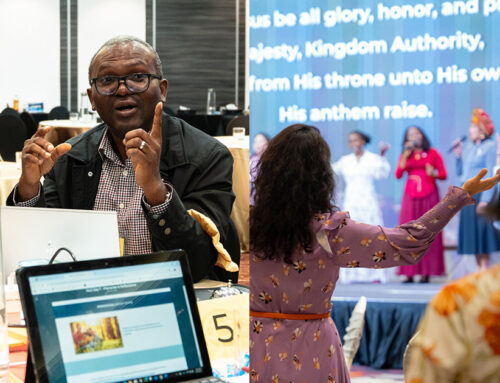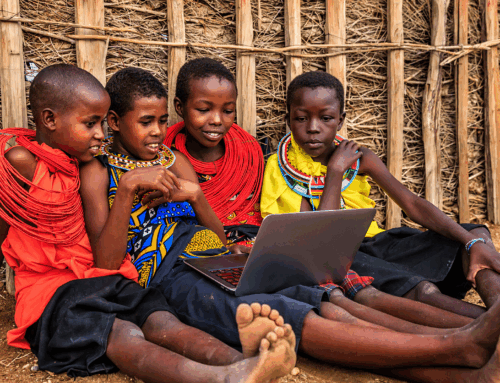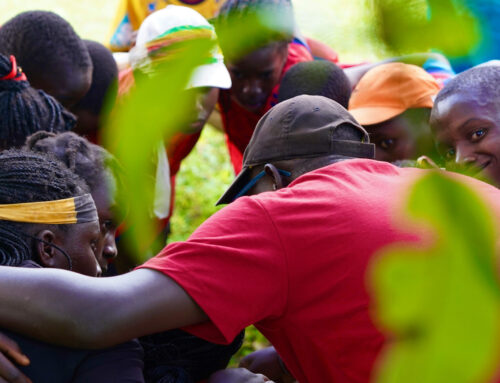But First, Actions of Mercy
“I love the Lord, for He heard my voice; He heard my cry for mercy. Because He turned His ear to me, I will call on Him as long as I live.” Psalm 116:1-2
This is the kind of relief and rejoicing in God that Haggai leader Edward Buria sees when visiting the drought-stricken areas in his home country of Kenya. As the people receive food and supplies from mercy ministries such as the one he is involved in, he sees hope arise. He sees it in the broad smiles of the children as they are handed bags of porridge flour to take home to their families, and he sees it in the faces of the women who line up in their traditional Kenyan clothes waiting to receive bags of rice. They know where their help comes from.
As a leader at the humanitarian organization Edfri International in Kenya, Edward has seen hundreds of families in need of aid and assistance. From areas plagued by drought to moments of national crisis, like the conflict and violence after the 2007 elections. While his team goes about meeting the physical needs of the people, Edward gets to share the hope of Jesus. He says, “We are able to demonstrate the love of God in ways that reveal how much God loves and cares. The result of such actions of mercy is many giving their lives to Christ.”
Edward’s sphere of influence is increasing as his organization earns a good reputation both nationally and globally. He reports, “The use of mercy and compassionate missions has helped us in reaching millions, giving marginalized communities hope and empowerment. The use of media has also enabled us in spreading the Gospel to millions in our nation and beyond. Our greatest catchment area remains reaching the thousands of youth in schools and tertiary institutions.”
While there is good work being done, there are still several hurdles that impede the sharing of the Gospel in Kenya. Among them are a lack of sufficient resources, difficulty in accessing hard-to-reach communities, and confusion and distrust sown by false preachers. However, in Edward’s mind, the biggest problem is that of “very few harvesters when the harvest is ready.” His goal is to equip and multiply leaders like himself to reach the multitudes in need.
Written by Carolyn Grant
But First, Actions of Mercy
“I love the Lord, for He heard my voice; He heard my cry for mercy. Because He turned His ear to me, I will call on Him as long as I live.” Psalm 116:1-2
This is the kind of relief and rejoicing in God that Haggai leader Edward Buria sees when visiting the drought-stricken areas in his home country of Kenya. As the people receive food and supplies from mercy ministries such as the one he is involved in, he sees hope arise. He sees it in the broad smiles of the children as they are handed bags of porridge flour to take home to their families, and he sees it in the faces of the women who line up in their traditional Kenyan clothes waiting to receive bags of rice. They know where their help comes from.
As a leader at the humanitarian organization Edfri International in Kenya, Edward has seen hundreds of families in need of aid and assistance. From areas plagued by drought to moments of national crisis, like the conflict and violence after the 2007 elections. While his team goes about meeting the physical needs of the people, Edward gets to share the hope of Jesus. He says, “We are able to demonstrate the love of God in ways that reveal how much God loves and cares. The result of such actions of mercy is many giving their lives to Christ.”
Edward’s sphere of influence is increasing as his organization earns a good reputation both nationally and globally. He reports, “The use of mercy and compassionate missions has helped us in reaching millions, giving marginalized communities hope and empowerment. The use of media has also enabled us in spreading the Gospel to millions in our nation and beyond. Our greatest catchment area remains reaching the thousands of youth in schools and tertiary institutions.”
While there is good work being done, there are still several hurdles that impede the sharing of the Gospel in Kenya. Among them are a lack of sufficient resources, difficulty in accessing hard-to-reach communities, and confusion and distrust sown by false preachers. However, in Edward’s mind, the biggest problem is that of “very few harvesters when the harvest is ready.” His goal is to equip and multiply leaders like himself to reach the multitudes in need.
Written by Carolyn Grant
But First, Actions of Mercy
“I love the Lord, for He heard my voice; He heard my cry for mercy. Because He turned His ear to me, I will call on Him as long as I live.” Psalm 116:1-2
This is the kind of relief and rejoicing in God that Haggai leader Edward Buria sees when visiting the drought-stricken areas in his home country of Kenya. As the people receive food and supplies from mercy ministries such as the one he is involved in, he sees hope arise. He sees it in the broad smiles of the children as they are handed bags of porridge flour to take home to their families, and he sees it in the faces of the women who line up in their traditional Kenyan clothes waiting to receive bags of rice. They know where their help comes from.
As a leader at the humanitarian organization Edfri International in Kenya, Edward has seen hundreds of families in need of aid and assistance. From areas plagued by drought to moments of national crisis, like the conflict and violence after the 2007 elections. While his team goes about meeting the physical needs of the people, Edward gets to share the hope of Jesus. He says, “We are able to demonstrate the love of God in ways that reveal how much God loves and cares. The result of such actions of mercy is many giving their lives to Christ.”
Edward’s sphere of influence is increasing as his organization earns a good reputation both nationally and globally. He reports, “The use of mercy and compassionate missions has helped us in reaching millions, giving marginalized communities hope and empowerment. The use of media has also enabled us in spreading the Gospel to millions in our nation and beyond. Our greatest catchment area remains reaching the thousands of youth in schools and tertiary institutions.”
While there is good work being done, there are still several hurdles that impede the sharing of the Gospel in Kenya. Among them are a lack of sufficient resources, difficulty in accessing hard-to-reach communities, and confusion and distrust sown by false preachers. However, in Edward’s mind, the biggest problem is that of “very few harvesters when the harvest is ready.” His goal is to equip and multiply leaders like himself to reach the multitudes in need.
Written by Carolyn Grant















